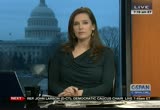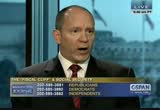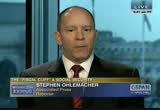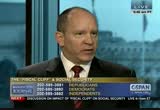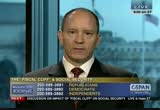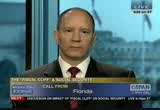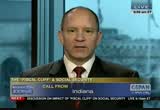tv Washington Journal CSPAN December 12, 2012 7:00am-10:00am EST
7:00 am
discuss how congressional leaders plan to handle social security as part of the fiscal talks. later at 9:15, more about the role of social security. ♪ host: good morning. welcome to "washington journal" on this wednesday, december 12, 2012. negotiations continue over the so-called looming fiscal cliff. yesterday president obama and john boehner spoke by phone. washington post reported however that they are still working on a deal and nothing is locked down yet. we will talk more about the fiscal cliff this morning on "the washington journal."
7:01 am
what tax deductions would you give up as part of a solution to the deficit problems? here are the numbers to call. for republicans, 202-585-3881. for democrats, 202-585-3880. for independents, 202-585-3882. you can also find us online. send us a tweet, twitter.com/c- spanwj. find a son facebook and weigh in there. at journal@c- span.org. "the christian science monitor," asked what we would be willing to give up. "americans would be willing to give up the tax deduction for charitable giving over other
7:02 am
popular tax breaks." host: let's take a look at the results of this poll. 25% said that they would be willing to give up the charitable giving tax deduction. almost the same amount said it would be willing to give up their deduction for state taxes. 19% said they would be willing to give up host: we would like to hear what deduction you would give up. you can weigh in on our facebook
7:03 am
page, there's a poll set up where you can tell us specifically which interests you the most, or perhaps which one you dislike the least. tom is from sioux falls, s.d.. good morning. caller: i would be willing to give up my earned income credit. that is $1,000 per year, for me. i would be willing to give that up if it would help the country. one that i would not give up is my standard mileage rate. i deliver newspapers, and that would be not good for me to give up that. host: thank you for the call. here is the message from twitter -- host: our question for you this morning is -- what would you give up? there is a question from "the
7:04 am
7:05 am
host: do you agree with our first tweet this morning, who does not want to give up anything? kentucky, independent line, good morning. caller: yes, i am 88 and i went through the last depression. i am thinking how much we had to pull the belt then. i think that if america would wake up and see that we do have to, the first thing that we have to do as citizens is stop spending. if the government would abide by the things that we did during the depression, neighbors helping neighbors, i want to continue with -- fortunately, my husband and i made plans, even
7:06 am
though he started give it -- getting social security in 1936 when i was in grade school, we both worked, of course, and we paid into it. so, i do not know that anyone needs to give up anything, if the government would just cut the spending and use the taxes that we give them fiscally. that is all i have to say. host: let me ask you this. we are looking at stories in the news this morning about compromise and stories on the table. as republicans look to democrats and democrats look to republicans to give something up, should the american people be asked to give up something? caller code probably so, but it is so needless when i think over the years about how much -- we did not have a lot of money.
7:07 am
we did not have credit cards back then. i can remember that we were very careful about what we purchased. i guess you might say we were very conservative. i think i have seen the government -- i have seen this come and go with president, with different presidents. i think about roosevelt having the wpa, the nra, the conservation program for boys that were taken out of homes and shipped to another state. they finished high school, but the mothers got $35 per month for sacrificing their sons. the w. pay -- wpa paid $12.50 per week if you had a shovel.
7:08 am
years later i thought that that was so nice of roosevelt that he did this, and then i thought -- where did he get the money to do that? host: thank you for the call. let's take a look at the c-span facebook page. you can see how our viewers and listeners are weighing in so far. we asked -- what are you willing to give up? so far the most answers have come in for charitable giving. tied below that is the mortgage interest deduction. also the deduction from sponsored health insurance. so far most respondents have said -- none of the above. mike sent this week --
7:09 am
host: kurt, you are next. what would you be willing to give up? caller: i think we need to go down a whole different road and completely revamped the tax code, simplify it and make it a flat tax. if you are at a poverty level, up to 150% of poverty, you pay 1%. it should be a sliding scale. as you go up, you pay more taxes. kind of all of the loopholes, all of the garbage. we wind up giving people right now who are medium in come thousands of dollars if they have four kids. you know? taxes that they paid in, they get refunds of money that they did not pay in. everyone needs to pay taxes and it should be on a sliding and simple scale. get rid of all the deductions.
7:10 am
7:11 am
host: another headline from "the new york times," "fiscal talks he up." boehner talks about where he will find allegiance within his party, the article also talks about where they will find support in the house from democrats. "no signs of reaching a deal revealed." as part of this so-called fix -- fiscal cliff, what tax deductions would you give up? fort lauderdale, hello. caller: hello. good morning. i feel that i would be willing to give up some of my medicare benefits.
7:12 am
i currently get free shoes and other benefits from medicare that i would be willing to give up. host: anything that you would be willing to give up on your taxes? items that you have in the past? caller: i would be willing to give up my charitable deductions. host: how come? caller: i feel that i give part of it to my charitable deductions. host: would you still make donations to charity if you could not write it off on your taxes? caller: yes, i would. host: thank you for your call. joe? caller: i would be willing to give up earned income credit and i liked what the last caller said about modifying the amount for charitable deductions. i think that sometimes the very
7:13 am
rich use that to give to charities that actually benefit themselves. i also have a contingency, which would be to reform the bankruptcy act and remove those benefits for companies that were put in place during the bush era. the main one being to remove funds for companies that declared bankruptcy without cutting back those funds, because it is really hurting workers. thank you. host: more comments coming from twitter, weighing in on the question. john says -- host: joe, houston, texas, let me clarify. if you have more than one home at one time, you can write off the first, that you of and the
7:14 am
others that you own, that is what john would like to see. joe, republican line. caller: like the other caller said, reduced from $1,000 to $500. host: do you benefit from that? caller: yes. host: you would still be willing to give it up? how come? caller: [indiscernible] i do not want to tax the rich. i make $150,000. i have to trucks, i have to employees, my taxes will go up. host: "the christian science monitor" had a survey with results around mortgage interest and charitable giving deductions.
7:15 am
caller: [indiscernible] charity, christmas time, toys for tots. host: theresa, illinois, hello. caller: good morning. i would be willing to give up a little bit more. i was forced into early retirement. i lost my job in february of 2009. i cannot find anything. so, i was forced to go into early retirement, so i am giving my extra 500 that i would have earned every month. i believe that that is a given. i am currently working as a private cleaning lady for homes, trying to make ends meet. my personal medical insurance,
7:16 am
for my pre-existing conditions, is over $600 per month. i am rooting for our president and believe that he should stick to his guns. we are giving the middle class as much as we can, but if i needed to, i would support what he goes for. host: from "the new york post" this morning, "details have begun to emerge."
7:17 am
host: we will be examining entitlements later on this morning as part of our series on the so-called fiscal cliff. we will look at social security coming up this morning. right now we are asking you the deductions that you would be willing to give up. joy? caller: good morning, how are you? i have an idea that i do not know how popular it will be, but i am not necessarily about giving up something on the tax deduction as much as i am proposing a new idea. that contribution to the presidential fund at the end of your taxes, changing that to say make a contribution to the debt. i would not giving up an extra portion of my tax return to do that.
7:18 am
i tend to make contributions to charitable donations. i do not get other deductions. maybe if we look at it differently, it would stop the arguing and bickering back and forth. if we could make a contribution to reduce the debt, i would like to see that change from other things on the table right now. host: what would you do if you heard that the deal included getting rid of mortgage deductions or charitable tax deductions? what would you do? caller, i would have to look at other areas in terms of concessions of how i make money currently. looking at my with holdings to make sure i had enough to cover the taxes that i owe each year. obviously, i would still be a
7:19 am
homeowner and i would contribute to the different organizations because they think they need that, but i do not think that that is the solution, perhaps. host: let's go to ben in wilmington, north carolina. hello. caller: how are you this morning? host: good, how are you? caller: i am fine. i would give up my volunteer benefits we are hoping to get, because it does not seem that we can afford them. also, things that i pay of my income tax, if they decrease my charitable contributions, i can live with that. [no audio] host: are you still with us? caller: yes, ma'am. host: one of our messengers said that if you own multiple homes, you should not keep getting it.
7:20 am
caller: the thing about home ownership in this economy is the pride of ownership and taking care of, it makes people work hard. but we have to be careful of the people who cannot afford it. i would live without the deductions. i look forward to my children being able to afford homes. host: do you get a deduction for both of your homes? caller: yes, ma'am. host: thank you for the call. this is from duane. host: that is a twitter message coming in to us. you can share your comments by writing twitter.com/c-spanwj. we have a special hashtag that
7:21 am
many people are using. we're watching that feed. judy, good morning. would you be willing to give up deductions and your taxes as part of your fiscal cliff solution? caller: actually, no. i am a republican, not a rich one. i would be willing to give up the obama care. this health care system now, which is free, i would be willing to give up the credit card for congress. and president obama's credit card. let them give up some deductions. let them take spending cuts and be fiscally responsible. the pros and cons, i have seen people that do not pay in and
7:22 am
get $1,000. but it does not matter how much we pay or take away, but there is still spending. i do not care what your income is, i am a real-estate agent. that is how i make a living. it is very important for a young couple, to put them in a home. to help them throughout the years. far as i'm concerned, president obama had unlimited spending dollars. host: how much does the mortgage
7:23 am
deduction help you and your business? caller: it is extremely important. host: does it help your bottom line? do you think you do more sales? caller: yes, it does. it makes more people eligible. these kids, these couples, they work very hard to say about their money, their down payment. yes, it is very important. host: this is what vivian says on twitter -- host: anthony responds by saying -- host: this news from "the wall street journal." "unions deliver a blow." with a look at what is happening in michigan, thousands of union supporters turned out on the steps of the capitol to protest
7:24 am
right to work measures. the measure passed. taking a look at the front page of "the detroit free press," "the law that is not over." "unions will not go down without a fight. recall efforts and legal challenges are possible." there you can see a union representative struggling with michigan state police yesterday over right to work legislation. here is the story -- host: "the washington post" has a map of right to work law
7:25 am
states. "the wall street journal" take a look -- takes a look at which states are the most union heavy. the biggest ones are new york, alaska, hawaii, and washington. michigan comes right in behind washington. which is why "the wall street journal" goes with the headline that this is a blow in a particularly union dominated state. looking at some other news, this one out of the south, for "the new york times," "the gop control in north carolina, with a republican controlled legislature, long a politically moderate player will soon have its most conservative government in a century."
7:26 am
a couple of stories in the news, looking back at what happened during the road to the white house, the campaign for the white house and others around the country. $10.6 million spent. the largest corporate donor of the 2012 elections, the company remains shrouded in mystery weeks after the election. the company donated $10.5 million to 80 party affiliated superpac, and overall 150 people, businesses, and unions, contributed $1 million or more, totaling $518 million according to the analysis from "usa today." doing a post-mortem, the mitt romney television strategy comes
7:27 am
under fire. television analysts gathered last week to hear some distressing news, showing that president obama far outperformed mitt romney in managing to target using their single expenditures of the campaign, tv advertising. the story goes on to look at the strategies of the campaign and where they were effective and where they were not. from "the washington times," a drone is deployed to spy on a farmer. host: our question for you this morning is what you think about tax deductions. what would you be willing to give up? keith, minn., good morning. caller: you are asking what
7:28 am
people could afford to give up. i think that a lot of people cannot afford to give up anything, they are constantly being taken advantage of, having their money stolen from them. everyone is allowed to basically take advantage of the public and we have no representation. a lot of people are just struggling to hold on, rather than continuing with everyone asking them, telling them they have to sacrifice. we have nothing left to sacrifice. we have given up everything, savings, everything. corporations, car dealerships, everyone is allowed to steal your money and there is no one to represent you. host: do you take advantage of deductions on your taxes? caller code beg your pardon? host: do you take advantage of deductions? do you itemize?
7:29 am
take the standard deduction? caller, i take advantage of deductions, but my point is it does not matter what you try to save, there is always a way for people to separate you from your money, no matter what you try. you can take a vantage of all kinds of deductions, taxes or any other opportunity that you can see to try to save money to try to survive and live, you know? but everyone has been -- there is just no representation. people have no one to represent them or stop these corporations from stealing your money from you. host: here is what independent says on twitter -- host: barry, it -- virginia, hello.
7:30 am
caller: thank you for your quality program on c-span. i would suggest that the deduction that should be eliminated is an industry specific deduction. just one example would be in the oil industry. intangible drilling expense, many other industries have these. the problem is that once they get past them, they are not reviewed, they are just there for a very long time, possibly forever. even if an industry feels like it should get subsidies, which is what these tax breaks are, they should go every year to congress in the appropriations process and make a case in full debate as to why they should be subsidized by the federal government and not treated to the breath -- through the back door of the federal government. there is a lot of money that
7:31 am
lobbyists have been able to get through these industry specific tax credits and deductions. i should say, i am giving up something, i am fortunate enough to have investments that include companies like this. i am sure the value of the stock would go down, but i am comfortable taking the hit of that before people in worse shape have to lose more, or until charities have to take less. i would say to start out with industry specific deductions and tax credits. that is all they are, federal subsidies. host: here is what michael says -- host: another one of our tweeters says --
7:32 am
host: touches on the flip side of what barry had to say, that came from wild and wonderful. what are you willing to give up? charitable giving is coming up with the highest number of respondents on facebook. lower on the list, state tax deductions, employer sponsored insurance deductions. no one has voted for retirement savings. and the majority of people are saying none of the above. palm beach, florida. good morning. caller: i want to comment about the deductions. another way of increasing taxes, i believe that the government is trying to get everything they can in their pockets.
7:33 am
some of the failed programs of the past are disturbing to me. the stimulus packages were in effectual in stimulating the economy. we have the affordable housing that was brought on by the government that costs the taxpayers an enormous amount of money. food stamps, printing them like they grow on trees. we have 47% of the people not paying taxes in this country. i think it is unfair to ask anyone to give up deductions. host: this message from twitter -- postal we got this e-mail from laurie, in india -- host: we got this e-mail from laurie, in indianapolis.
7:34 am
host: charles, tenn., democratic line. caller: how are you doing today, ma'am? host: good. caller: i am on social security, disabled now. a lot of these taxes, like the deduction for political contributions, that should be taken away. i have not heard anything about that. they can make us still pay social security taxes at a lower rate, maybe 10% to 25%.
7:35 am
there are a lot of deductions and things that they can do to make the country better, but nobody is wanting to do it. these corporate deductions, they could be taken out. you said it in the article before, there is no forum where anything is going to work, but people like me need to pay their fair share at a reduced rate. thank you for letting me talk. host: roger, independent line. hello. caller: yes.
7:36 am
hello. as far as what i am willing to give up, i am willing to give up just as much as everyone else. that is why i think the spending cuts should be across the board equally. if you are going to take 1% away, you should take it away from every other spending program in the budget. as far as the tax code, it is so complicated, i would not even begin to know where to address that. i would like to see a simpler tax code, with no deductions for anything, so that everyone is treated the same under the tax code. i know that that is probably not going to happen. host: why not? caller: i just have not seen any movement on that in 40 years and i do not think -- i do not see
7:37 am
any movement towards it now. that would be the best solution, though, it would be a simplified tax code like that. host: do you take any deductions? standard or specific? caller: i take some. there are different deductions. you cannot generalize, each person can attack the tax code or use it in different ways. you could never look at someone and assume they are paying their fair share. and you do not know how good their accountant is and what deductions they're able to take advantage of. i will say that if you are going after deductions, everyone should give up something, not just the people with an income who are able to take a vantage of those deductions.
7:38 am
i would like to see low income people get back at the end of the year under the earned income tax credits. i would like to see them give up something as well. let's do away with that program and stop paying people that. the only thing that they have to contribute to this conversation, let's make sure that they give up something as well. let's not take it all back for the people that work hard and earn the money. host: here is what been would be willing to give up on twitter -- host: let's take a look at some other stories in the news this morning. north korea claims success in a rocket launch. the effort is seen as a provocation and advancement of
7:39 am
the missile program. reporting from seoul, north korea launched a multi stage rocket that appeared to travel the entire distance and put an object into orbit, making it the most successful of the country's attempts at testing long-range technology. over here on the side you can see a long shot of the north korean rocket based on a satellite tracking estimates. you can see the launch site and the splashdown site as it moves on. we got a notice in the media from the north american radio air space command, which had formerly acknowledged that there missile warning system detected and tracked the missile at 7:49 p.m. eastern time. the press release goes on to talk about where it went, where it fell. at no time were the missiles a threat towards america. on the international front, the
7:40 am
u.s. moves to shore up syrian opposition groups. the obama administration has designated a group there a terrorist organization and will collectively recognize the coalition of syrian groups as legitimate representatives of the country. this is information that we learned from an interview that president obama did with abc news. in line with that, the u.s. will formally recognize the opposition council as the leader of the syrian people. officials say that the u.s. afghan force may total 9000 after the year 2014. the obama administration plans to keep between 6009 thousand troops in afghanistan after 2014 and they will confine most of them to fortified garrisons near the capital, leaving afghan troops largely without american the advisers in the field. another story from afghanistan
7:41 am
-- "slow gains in justice for females." women who are victims of violence often report abuse that -- rarely report abuses to government authorities and rarely see their cases go to trial." that is a story in "the new york times." looking at the domestic front, "ben bernanke is to make a last fiscal cliff police." "topping a yearlong campaign, he would get one last chance to talk washington down from the fiscal cliff.
7:42 am
host: c-span will be carrying that press conference live, fed chairman ben bernanke, on c-span 3. you can find that at 2:15 p.m. eastern time. you can find it on their website, we will be archiving that after the fact. what deductions would you give up? let's go to dawn in eugene, oregon. caller code good morning. listen, the contribution thing is a way to be of service, as far as i'm concerned. host: by contribution you mean charitable contribution? caller: yes. it is something that i would want to keep.
7:43 am
i mean, not keep, but i would be willing to contribute to that concern about taxes. my main concern is the mortgage deduction. how severe -- many of us have every dollar that we account for on the federal. if we did not have that, we would be up to 25%. this would be quite a severe blow if this were done in a cut and dried fashion. maybe they can do a tiered thing? that is the thing about taxes, a lot of people purchase property taxes, i am really for a federal
7:44 am
sales tax. maybe some of us could keep the deductions that we are accustomed to or that we need, but maybe on a local level or federal level, i do not know, people have a fair share coming in. the burden is on the property owner. it is kind of crazy, you know? cities are projecting that in a couple of years they will be worse off now. whenever types of tax forms that we have, i would think that they would be more inclusive, irregardless of your having a home or not having a home, whenever you are doing. i would be willing to pay the sales tax, which would be more pay less.
7:45 am
that is about all that i have to say. we need help. host: this is what joseph says on twitter -- host: john, indiana. good morning. caller: we should skip this and let both parties walk away, let the budget control act stand, let sequestration happen. all last year the democrats and republicans complained about having a balanced approach with more taxes and less spending. it is not a cliff, it is just fear mongering. i think we should just let it happen and then get back to the grand party next year. host: as part of that grand bargain, would you give up some tax deductions?
7:46 am
caller cannot until i see spending cuts. last year we had the $300 billion budget control act first time cut. they keep just pushing these spending cuts down the road and not addressing it. they need to be addressed first. host: a final look at the pole on our facebook page. what are you willing to give up in terms of tax deductions? most people chose charitable giving. behind that is the mortgage interest deduction. behind that, state tax deduction and employer sponsored health insurance. the majority of people who weighed in said that they would give up none of the above. thank you for all of your calls and comments. coming up next we will talk to john larsen, the outgoing democratic caucus chair from connecticut. later on we continue our fiscal
7:47 am
7:48 am
inspiring. in 1821 a european diplomat told congress that it was neither large nor khatami inspiring -- often inspiring -- awe inspiring. perhaps some president would be inclined to become the permanent resident if it were. >> niki goldberg has gathered some of her favorite white house photos. watch on sunday evening. eastern and space -- eastern and pacific. >> my inspiration was the idea that i wanted to explain how it happened. we do know the story of the cold war. we know the documents, we have seen the archives that describe the relationships between roosevelt, stalin, churchill, and truman.
7:49 am
we know the main events from our point of view. what i wanted to do was show it from a different angle, from the ground up, what did it feel like to be one of the people subjected to this system. how did people make choices in that system? how did they react? one of the things that happened since 1989 is that the region called eastern europe has become very differentiated. these countries no longer have much in common with each other except for the common memory of communist occupation. >> more on poland, hungary from the end of world war ii. from her historical narrative, iron curtain, sunday at 8:00 on "q&a." >> "washington journal" continues.
7:50 am
host: congressman john larsen, good morning, thank you for being here. we are hearing about the back- and-forth of the fiscal cliff. where do you think that things are at with the negotiations? caller: i am always a glass half full type of guy. i think that speaker boehner faces a unique challenges in his conference, ultimately i do not think that john boehner will stand by and see the nation go over a fiscal cliff. i do think that there are so many issues that we agree on, on both sides. you can see this in a number of members, members who have come forward and said i think similar things. first and foremost, put the country back to work. putting people back to work is
7:51 am
the democratic or republican, it is just common sense. we know that job creation equals deficit reduction. the president has a plan out there. if the president and chris christie canned me -- can meet in new jersey and talk about streamlining the process, there is more than a compromise here. we know we have to rebuild the states that were ravaged by hurricane sandy. we know that the whole nation needs help. let's roll up our sleeves and send a clear message to our fellow americans in the rest of the country that we are prepared to go back to work. this is neither a democratic or republican issue. infrastructure is vitally important to everyone.
7:52 am
it shouldn't take anything more than calling the bill up and voting on it. i think it the other issue that everyone agrees on is the whole issue with regard to the middle class tax cut. everybody, including billionaires', would get a $250,000 tax cut. why risk the uncertainty, why take people to this fiscal cliff during this holiday season when this could easily be addressed? then you can come back and haggle in january. no one has to break a pledge. as tom cole eloquently said, he is not raising anyone's taxes, he is preventing them from being raised on the middle-class. step up to the plate, send that message to the entire world that we are secure. long-term, i think we need to
7:53 am
focus on health care costs. paul ryan had it right when he said that health care costs are the chief reason why we see a rise in domestic spending, why is that so? look at the gdp of health care in the united states. it is greater than 17%. dropping since we passed the affordable health care act. there are many things there that will help to lower it, we have got to bend the curved. it lowers the cost of health care and makes it more affordable, a good goal, and it also deals with the deficit in the short term and long term. those are not my words, that is the head of etna in my district. there is a way for us to, in the short term, by dealing directly
7:54 am
with the tax cut, save the learning issues for january. i was listening a scholars came in and tried to talk about where they would make deductions. you really do need to have a comprehensive plan. people have got to see where the things are going to fall. you cannot go at this piecemeal. as the discussion ensued last night, there was compromise here and there, lowering rates and allowing people to move forward. at the end of the day, we have got to get the job done. i believe the australian prime minister said this -- america is one vote away of again being the dominant economic force in the global economy for the next century. it is all a matter of whether congress has the will. i believe that john boehner will get the votes that he needs and we will have a package before
7:55 am
the session is over. to johnt's listen boehner on the floor yesterday. [video clip] >> the longer that the white house slow walks this process, the closer we get to the fiscal cliff. we know that the president wants more stimulus spending and an increase in the debt limit without cuts or reforms. that is not fixing the problem, frankly. it is making it worse. on top of that, the president wants to raise tax rates on small business owners. even if we did exactly what the president wants, there would be red ink as far as the eye can see. that is not fixing the problem either. it is making it worse and hurting the economy. members know that i am an optimist and am hopeful that we can reach an agreement. this is a serious issue with a
7:56 am
lot at stake. the american people sent us here to work together toward the best possible solution, meaning cutting spending. if the president does not agree with our approach, he has an obligation to put together a plan that can pass both chambers. >> congressman, -- host: congressman, what are you pretty to -- privy to, information that we do not have? guest: we have a week keyboard that we use it frequently. -- oija board that we used frequently. no, you have to give a lot of latitude to the speaker in this situation. there is a bill setting on the floor of the house currently, a bill that deals with putting people back to work and also giving everyone a $250,000 tax
7:57 am
cut. we have already cut the budget by $1.60 trillion. so, i understand the problem that john boehner has. it is dealing with the more -- i would not say radical elements of his party, but those who are locked into this position of the grover norquist pledge to never raise taxes. well, they do not have to do that, but it is about finding a way. there are still those that say that any give on this situation is wrong and they refused to compromise on the issue. you have to allow him to compromise on this conference and allow the path to move forward. you see republicans coming out daily and saying that we all agree that the country needs to
7:58 am
be put back to work. there is infrastructure damage that needs to be addressed. we cannot agree on this before we go home, the most powerful country in the world? it is on government. there may be some who are at war with their own government within the republican conference. that is not good news. i have confidence that boehner will get this one. host: if you would like to speak with the congressman, here are the numbers to call. for republicans, 202-585-3881. for democrats, 202-585-3880. for independents, 202-585-3882. let's go to bruce, chicago, illinois. caller: representative, i wanted to ask you another question. host: if you would likedemocratl elements of the republican party, was yesterday's
7:59 am
demonstration in michigan radical democrats? guest: i was not at the demonstration in michigan. i do not know if you heard me correct myself, i think they are recalcitrant. there are republicans in the conference who are locked in and, unfortunately, from my perspective, taken a pledge to grover norquist in a commitment to not raise taxes in any shape, manner, or form. as i said earlier, we have already cut $1.60 trillion, there has been not one penny of revenue that comes from tax increases. so, that is where the discussion continues to be. the middle class is being held hostage. i am talking about billionaire'' getting a $250,000 tax break.
8:00 am
why would we not allow for that to go forward, then coming back to haggle over the broader context of tax reform and what we will do with the tax rate and where we will be, ultimately, with respect to deductions? host: this is the headline from "the washington post." "michigan passes what you make of this? guest: it is a blow to working people all across the country. when you look at where unions have been successful, wages are higher. unions are responsible for lifting the american people into the middle class. through collective bargaining, sustaining and making sure
8:01 am
people are in a decent wage. i think the president said it well. it's not an opportunity -- it is an opportunity for people to earn less when you have legislation like this. interesting how michigan moved along this line. i think there will be a backlash. once people think this through, they will fundamentally begin to realize it is important. host: pennsylvania, democratic line, joe. you are on with congressman john larson. caller: i agree with what the congressman started off saying. not talking about the fiscal cliff but about jobs. this is what you don't hear on any of the major media, especially fox. just the fiscal cliff all day long. and don't raise taxes on the wealthy or corporations. the corporations in this country
8:02 am
are sitting on record profits this year and are not creating jobs. in the last segment before the congressman, there were talking about what would you be willing to give up. i would be willing to give up just about anything as long as everybody else gave up the same. some of these bankers, they should end up behind bars. they are criminals. it is wrong. that's about all i have to say. guest: it is always insightful to remember how we got here. when people talk about the fiscal cliff, these are artificially manufactured legislative problems. what do i mean? this started with a whole debate of the debt ceiling. you may recall that in the summer of 2011, we nearly went
8:03 am
over the fiscal cliff by not paying our debts. that caused our bonds to be downgraded because we had an element within the republican conference that was willing to take us to the cliff and hold us hostage. when you look back and see historically that the debt ceiling was raised 17 times, under ronald reagan and eight times under george h. w. bush canada seven times under bill clinton and six times under george w. bush, really it is honoring the full faith and credit of the u.s. government. , iaching that to a debt understand ideologically why people might want to do that, but why would you take the nation to this process? there was a passage of a special select committee. that select committee, if it did
8:04 am
not respond with further cuts and tax increases, would seek a so-called sequestration comoe spending domestic and military spending. already in congress we obscene that while the cuts have been made on the military side, some would say there's more to come and on the domestic side and others would argue there's more to come there, the cuts have been severe. but there has not been a single cent of revenue raised even from the nation's wealthiest 2%, who have done pretty well even in these bad times. so here's where the fairness of the whole argument comes in. the fairness is not that this in and of itself is going to cure the problem, but it sends a clear message with respect to
8:05 am
fairness on two fronts. everybody in the middle class continues to receive their tax break instead of getting a tax increase in january. when i say everybody, not only the middle class, even billionaires'. over 250 cows and dollars now subject to the same rates as they were under bill clinton. which we had 16 consecutive quarters of economic growth and prosperity and the nation was well on its way a, retiring our national debt by 2009. $250,000 no subject to the same rates as the were under bill clinton. when i go to my hometown and you mentioned sequestration, they look at you like you are on mars. what they care about is jobs. they want to see the country
8:06 am
back to work and the nation pulling together. they saw vividly chris christie and barack obama, the president and the governor of new jersey on the jersey shore line after the disaster saying we have to rebuild, we have to invest in the american people, and that means investments in infrastructure. not just for repairs but to improve so that commerce continues following. the key element in all of this, the president talked about it again yesterday and we had bills on the floor and we ought to be addressing this issue. host: congressman john larson represents connecticut's first district and is the chairman of the democratic caucus. he just won reelection and is wrapping up his seventh term in congress. in usa today it says -- what are you telling members of
8:07 am
the democratic caucus? you plan to have a meeting later on? guest: we had a meeting yesterday and on this matter. chirs van hollen, the budget chair, who has done an outstanding job, first of all, we have already cut $750 million in terms of looking at what i call insurance programs, not in delma programs, -- not the president has recognized there is still room for us in many other areas to squeeze more out of the inefficiencies in the system, not on the backs of beneficiaries. this is where they trouble is. republicans say they want cuts, so the president says if you want them, show me. the president has been detailed
8:08 am
in where his cuts and tax increases will come from. he has even dropped down from $1.60 trillion in revenue to $1.40 trillion. we have not seen any movement on the part of the republicans. there is broad latitude for us to move. but on the issue of beneficiaries, our leader nancy pelosi was very clear. it's a question of math. you simply don't get the revenue or kind of savings. logically, i think what americans think about this, who is at fault for the rise? is it the beneficiary? going after the person receives the benefits, and that's the way to balance the budget? if we are at 17% of gross domestic product for health care and our closest competitor is at 10% and as universal health care, if you think we have full room to drop the costs?
8:09 am
you think there are a lot of inefficiencies in the system? when you look at medical devices and pharma and doctors and insurance, yes, there's room. as we lead up to the exchange that will be put in place in 2014, that's where we should be working. here's the compromise. the exchange opens in 2014. this is a republican designed concept where you allow the free market and competition to take place. and a lot of good benefits, many of which are in effect already, including dealing with pre- existing conditions, capping costs so no one has to lose their house over health care, providing for screening and preventive health care, allowing kids to stay on their parents' policy. until age 26 let's make it more successful, attract small businesses, and make health care more affordable, drive down the debt, and keep this economy humming.
8:10 am
host: let's look at some of the details. here's what we know so far. coming from the white house, they're now talking about $1.40 trillion in revenue. turning to the republicans' fiscal cliff proposal, where is the white house talked about the $1.40 trillion in revenue, republicans are talking about its $800 billion in revenue. if you also see help savings and other mandatory savings, discretionary savings, and some revisions to the consumer price index of $200 billion. david is a republican. welcome. caller: i think you mean
8:11 am
michigan. host: i do. guest: hi. caller: i disagree with you greatly. guest: that's what makes it a great country. caller: in michigan we are experiencing a lot of violence from your constituents. when our tea party members went to washington and protested, and you tried every way in the book to find something wrong in what we were doing. most of what we did was to sit there and say the rosary or pray or hold a sign up and protest. your constituents are threatening my life when i walk to say my point of view. but don't hold signs of protest or say prayers. paper and lives. threaten people's
8:12 am
lives. when i was helping to break a strike in connecticut, we were designing the u.s.s. trenton submarines and i was breaking the marine drafting strike. [dog barking] i walked through the picket lines and they were threatening me. i turned around and did the same period a police officer came up and told me if you do that one more time, i will put you in jail. i said, what about what he is saying to me? the policeman said that is their collective bargaining rights, that is legal. host: we will take your comments and a throwback to the congressman.
8:13 am
the dog is barking. guest: experience you had in connecticut, i'm sorry for that experience. sorry if you encountered strikes in michigan. unfortunately, as we have often seen on the frontlines of concern over issues that affect people's economic stability and their livelihood, emotions run deep. they also ran deeper here during the whole debate over the affordable care act. it is both the right of the tea party and also the right of labor to rally. they are entitled through speech to say whatever they like. often painful and sometimes hurtful, as was the case here in washington, d.c., involved in
8:14 am
incidents with john lewis and andre carson and anna emanuel cleaver. emanuel cleaver. that is unfortunate and we wish that would not happen, but it is the rights people have. as you pointed out, there were police on the line so they can keep order towards a more civil society. let's hope that we can all get beyond this and all focus on what is in the best interest of america, what is in the best interest of putting the country back to work. how it is that we continue to build and grow middle-class and the constructive things we need to do. i think we have got to get beyond this issue that jobs are a democrat or republican issue. and to understand it is an american issue and we owe it to the people to make these kind of investments to continue cto have the country to grow and
8:15 am
allow the people to earn a decent wage and send with clarity and certainty that they will not see their taxes go up because of an artificial bill where congress is planted in with one another as we reach the final deadline. ets --a couple tweak guest: if all the tax cuts and said, if the bush tax cuts were to sunset, there would be about 4.5 trillion that would come into the coffers. you would say, that could help us with the problem, but the cuts that will take place in terms of what it would do to the economy, in terms of what it would do to people that are
8:16 am
already out of work, end up being counterproductive and therefore not helping at all. so it has to be a measured approach. i think it's why some have said we can let the nation go over the cliff. i think that would be a disaster. it sends the wrong message. if we can demonstrate to the rest of the world that as the preeminent democracy in economic, military, cultural leader in the world, that we can come together and resolve these issues through compromise, then the rest of the world's money will end up being invested here, because we are that beacon of hope. we have the best patent laws, the best education system, especially in higher education, and we have the best opportunity for economic growth. let's take advantage of that and
8:17 am
focus on the positive side of what we need to grow instead of teetering on the edge of the negativity that draws us apart. host: carole in annapolis, maryland, a democrat. caller: hi. i live in connecticut 20 years. guest: god bless you. caller: i loved it, but recently moved to maryland. there are two oaths of office. i'm an active member of three and took a pledge of allegiance to the united states of america. every child in this country takes a pledge of allegiance to the flag of the united states of america and to the republic for which it stands and so on. every congressman and congresswoman that takes a pledge, something like i asked solemnly swear or affirm that i will support and defend the constitution of the united states against all enemies and so on. then i will have allegiance to
8:18 am
the same that i take this obligation freely, without any mental reservation or purpose of evasion and that i will faithfully discharge. when i hear that oath and i think the republicans have the gall to pledge allegiance to an individual, grover norquist, who is not an elected member of our congress, and they are wiping their boots on the mat of the united states of america, that they have the nerve to put the american public at risk in the face of the world, it is unbelievable. the jobs they are trying to protect our their own.
8:19 am
they are gerrymandered into office and they feel like if i stick with this pledge, no taxes at all ever on anyone, i will get reelected by my constituents. host: we actually have grover norquist here on the show tomorrow morning at 7:30 eastern time. guest: that will be in the great show. grover norquist is a very bright, intelligent, focused individual. he has a point of view and it is a point of view that i think people got to listen to, but we don't take a pledge of allegiance to any individual. we take a pledge allegiance to the constitution, to defend and protect it. so it is disconcerting. i know many people, when they hear that, get upset. it is also a belief or notion -- and one of grover norquist's most famous lines, when he said,
8:20 am
"i want to shrink government so small that i could drown it in the bathtub." when you think about that, while it may sound like a good metaphor, who is the drowning? i had a mother on medicaid who just passed away in october. i walk up and down those halls and see the people that are receiving help on medicare and on medicaid. drowning them, i think not. i think we have to get beyond these pledges that people take. another aspect of this, it is not so much the pledge, and how the pledge is backed up. that is money in politics and also the need for us to have campaign finance reform, something i'm proud to be working on with our leader nancy
8:21 am
pelosi, where we feel this acronym of "dare," which is to disclose fully so people understand where money is coming from, how campaigns are being funded. i have to put on every commercial, everything i do, i am john larson and i approve this message. the same thing is true for amending the constitution. it would be a healthy discussion in this nation to talk about the amount of money in politics and where it comes from and what we can do constructively to make sure that we're getting our arms around that. the other is reform. i'm a leading sponsor of the fair elections now act. there are many good proposals out there. we need to bring peace together. republicans like walter jones have been in the forefront of recognizing that this system is wrong, it's broken. it is legal, which is frightening, but it is one of the most corrosive elements of our democracy, is the amount of money that is in the system and
8:22 am
it needs to be addressed host: representative john larsen, chairman of the democratic caucus, also committee member of the ways and means. here is something from the national journal, united technologies, congressional connection poll. it says -- then looking at another poll from gallup -- what are democrats willing to give up in the short term? guest: we have already given 1.6 trillion in cuts. we already have cut into the medicare program by 750 billion. host: you are saying ? -- saying hold the line? guest: no, i'm saying where's
8:23 am
the revenue. even attacks on the 2% does not close the gap, but it is a question of fairness in terms of where are you going to balance the budget. through no tax increases whatsoever, which is the pledge to grover norquist? or are you going to do it through reasonably and ,esponsibly looking at cuts inefficiencies, bending the curve of the large cost of health care, which drives the domestic side, looking at greater efficiencies on the military side as well, and then focusing on the revenue that should come in as well. the president's call for $1.40 trillion in revenue over 10 years, reasonable amounts of money. when you get bill gates and warren buffett's and most responsible economists say that you have to have revenue on one side of the equation. even john boehner recognizes
8:24 am
that. far lower than what the president is saying is the $800 billion. i think they understand this. we are moving in the right direction. i understand a painstaking effort this will take in a conference the republican call their caucus a conference and to call are as a caucus -- in their conference they have more of a problem moving. and they are in the majority. so they determine what comes to the floor and what does not. that is john boehner -- that makes dunnigan's double little bit more difficult. i remain optimistic that for all the reasons we can work together outweigh the reasons parethat will divide us. guest: he's right. at the clinton tax rates and those spending levels, the whole national debt would have been paid down by 2009.
8:25 am
in 2000 we had, after september 11, two wars, and funded and unpaid for. and a windfall in medicaid that we corrected in 2010 with the affordable care act. and the tax cuts. the tax cuts have become the focus of this work. we are winding down the wars in iraq and afghanistan. we're out of iraq and winding down in afghanistan. then we ought to be able to take and use those monies that we are going to say from that to reinvest in america's infrastructure and put people back to work. host: helen in warrenton, virginia, independence. caller: i have a question about - i have not heard a lot of people talk about this, what is referred to as the marriage penalty. i'm having a hard time understanding how two people
8:26 am
that live together each making $125,000 or $130,000 per year are any more well-to-do than two single people that live together each making the same. although the combined income of a married couple of more than $250,000 suddenly gets pushed up to a higher tax bracket. how much attention has been put on that and if there is any possibility that might be adjusted to today's times? guest: yes, it always comes up and it should be adjusted. there's a huge number of things, including the alternative minimum tax that will also take effect. all this will happen at the end of the session. i believe what will happen is a
8:27 am
continuing resolution, because there simply isn't any time. we have been here more than a month and have yet to take up anything while the discussions go want ad nauseam. but you are right. and they should take up extending tax cuts and extenders and breaks that will help to spur business and research and development, making sure that a penalty does not fall unfairly on individuals, and also the alternative minimum tax, several of which we have had an opportunity to address. i think all of them should be addressed, and , prince of tax reform, where we bring everything together, lower the rates, make it revenue neutral, and provide an opportunity for economic growth. host: in stamford, arizona,
8:28 am
democrat -- in stafford. caller: this is nadine. i'm 73 and i make $22,000 a year. i pay $400 in taxes. my insurance and property-tax is when appear to hundred dollars this year. you gave me a social security raise, but they took it all in medicare premiums. what do i give upper? -- up? i cannot give up anything. there's nothing to spend in extra. i don't make any interest on my savings, nothing. host: before we let you go, how important to you is that congress reaches a compromise? we saw the gallup poll that says 70% of americans want them to compromise on the fiscal cliff. caller: it is very important that they keep all these things. i'm not in the middle class. i have a low income.
8:29 am
and they're gone to take more taxes? i cannot afford it. guest: hers is the voice that should be heard all across the country, because she is so succinctly describing what is happening to people. $22,000 is what most medicare average.s receive on she went through the litany of what she has to pay and the incurs.at euchrshe it makes no sense to take the money from helen. we just had this argument in a presidential race. and the public is all on the side -- including the very wealthy in the country say we understand that there has to be fairness in this and that the government is not asking much more.
8:30 am
it only happens when you get dug in on these issues. it will be a shame if the republicans take us over the cliff, because they would rather see their rates rise on people like helen instead of coming up with a compromise and seeing everybody get a $250,000 tax cut. it also points out the very fragile nature of medicare and medicaid and why we should be seeking to bolster and strengthen them, not to further prevent beneficiaries from receiving the kind of care that they can. that's why the affordable care act is so important. that's why i believe that with the exchanges set up and the full act going into effect in 2014 it will allow us to extend the life of medicare, to bring down the costs associated with health care that supersede any
8:31 am
other western industrial country in the world, by providing better access, better preventive care, doing away with pre- existing conditions, allowing kids to stay on their policy, and allowing people like helen to get the preventive care at an affordable price that allows her to exist and home in arizona. thanks for your call. you have spoken the truth. host: before we let you go, you are chairman of the democratic caucus. we see this story that says you are winding up that tenure. a representative of california will be taking your job. where does that leave you? guest: peacock one day and the other duster the next.
8:32 am
i am attracted to the pedestal caucus right now. actually, term limits are a good thing for leadership positions, especially at the caucus level. xavier becerra and joe crowley will do an outstanding job for our caucus. but i believe in that process. i'm also pleased that nancy pelosi stepped up and is going to lead our caucus again. she is an extraordinary leader, as are standing hoyer and jim cliburn. they work in tandem. what i am proudest of that i got to chair the most diversified parliamentary body ever assembled by a nation state in the history of the world. i call it not the democratic caucus but america as caucus. i'm very proud of that and the things that we were able to
8:33 am
accomplish. it's always good to see a new come in, the caucus is where you hold a leadership responsible for what their agenda and goals are throughout the year. xavier and joe i think will do a very good job. host: representative john larson leaving the chairmanship of the democratic caucus but not leaving congress. getting ready to start his eighth term in representing connecticut's first district. if thanks for your time. you're welcome. host: we will be looking at social security, next. stephen ohlemacher will join us, followed by roundtable discussion. first news update from c-span radio. >> its data clock 33 eastern. defense secretary leon panetta is in afghanistan today. in remarks to about 100 u.s.
8:34 am
service members inside an aircraft hangar at a desert base, he thanked them for their service and emphasized that the u.s. is winding down its involvement in the war. he also said that president obama will decide in the next few weeks how many u.s. troops will stay in afghanistan after the combat mission ends in december of 2014. there are currently 56,000 u.s. troops there. north koreans dancing in the streets of their capital today after the regime successfully fired a long-range rockets, defying international warnings. gallants is likely to bring fresh sanctions and other punishment from the u.s. and its allies, which were quick to condemn its asked a test a technology for a missile that could attack the u.s. mainland. p'yongyang says it was merely a peaceful efforts to put a satellite into orbit. national security council spokesman is calling the launch "another example of north korea's pattern of irresponsible
8:35 am
behavior." yesterday he said the u.s. "remains vigilant in the face of north korean provocation." those are some of the latest headlines on c-span radio. [video clip] >> the white house was very controversial as most things in america were. the design of washington city, there was competition. he submitted a design for a palace. americans were not having a palace. it was not particularly on inspiring -- not awe-inspiring. it was neither large nor awe- inspiring, the paper said. "the building serves its purpose. if it were larger and more elegant, perhaps some presidents would be inclined to become its permanent resident." >> a former new york times
8:36 am
writer vicki goldberg, sunday evening on c-span3. washington journal continues. host: our series on the fiscal cliff continues this morning with a dive into social security. here to talk about the program and how it is involved in the discussions, the negotiations over america's financial future, is stephen ohlemacher, joining us from the associated press, where he is a reporter. hohow much social security to people get? guest: >> 66 million people. the average benefit is a little over $12,000 -- a little over $1,200 a month. maybe $13,000 a year or so. host: we are talking about retirees and the disabled. guest: a fairly wide group of
8:37 am
people receive social security benefits. retired workers, spouses, children, disabled workers, widows, woodward's. -- widowers. a big safety net of people. host: retirees receive about $1,200 a month on average. the benefits for the disabled, $1,100 a month on average. how does social security get financed? guest: it has been a self-funded program since its inception. it is funded by payroll taxes. there's a 12.4% tax on wages up to about $110,000. if you make more than that, any money you make over that is not taxed as part of social security. the tax is divided equally
8:38 am
between your employer and the worker. for the past two years, the workers' share of 6.2% has been reduced temporarily to 4.2%. as the temporary tax cut that went into effect over the past two years, than is saved workers an average of $1,000. host: you can see where the money comes from in this pie chart. payroll taxes making up 83%. also, interest and taxation of benefits. what are some of the other numbers we are seeing? guest: what you are seeing is the interest is from the trust fund. when the last time so security was overhauled in 1983, but put in a system that generated more money in tax revenue than what was being paid out in benefits.
8:39 am
a trust fund was built up. that stands at $2.70 trillion right now. with social security had the additional money, actually held by the treasury, they invested in treasury bonds. interestbonds aearn there that's where the big portion of your income for the trust from guns from, interest. and if you get benefits above a certain amount, that is also taxed. host: the social security trust fund, for old age and survivors insurance. the also see disability insurance. guest: social security is not just a retirement program, it's also for disabled workers. if you are disabled, if you have a disability that prevents you from working and that condition will last at least a year, then you can apply for it and get social security disability benefits as well. it's not easy to get them.
8:40 am
that program is a lot more complicated than the retirement program. so it is a social insurance program. it's not just a retirement program. host: how does social security factor into the fiscal cliff negotiation process? guest: the republicans put forward a plan in the last few weeks to change the way the annual cost-of-living adjustment is calculated for social security beneficiaries. the cost of living adjustments, known as the cola, it's the annual increase in benefits people get in their monthly payments. this coming year, next month in january their scheduled to get a 1.7% increase in benefits. that is based on a government measure of inflation, the consumer price index. specifically for so security, they use the consumer price index for urban wage earners. there's a new measure of inflation that the government
8:41 am
has been considering for while called tehe change cpi. on average the social security administration aptells us the cola would be 0.3 percentage points less than what it has been. so the 1.7% increase coming in january would be about 1.4%. last year the increase was 3.6% during that would be about 3.3%. that is the biggest effect of adopting this new measure of inflation that republicans put on the table. the reason why we have been focusing on this and many advocacy groups for older americans have been focusing on this, the president -- i would not say he agreed to its, a year-and-a-half ago there were in deficit talks and the talks fell apart. he put on the table the idea of
8:42 am
adopting the change cpi. and the speaker of the house supports it now. it makes it in play. our other political dynamics on capitol hill that make it a lot more difficult to adopt. this is a very subtle thing to do to change the way the government measures cpi, but it has far ranging effects, effect that go far beyond social security. if it is projected to raise about $200 billion over the next 10 years. if they adopted it across a whole government, it would affect taxes over time. every year our tax brackets are adjusted for inflation. if they are adjusted a little less each year, as you make more money, you would move into a new tax bracket and you get a tax increase. it's about $60 billion tax increase over the next 10 years. it could affect anti-party programs. the amount of money that you can make and be under the party line
8:43 am
is adjusted each year for inflation during that would go up less each year, and that would mean fewer people would qualify for anti-party programs. -- for anti-poverty programs. the idea saves money. not that much money a first, but it saves a lot of money over time. all over $200 billion in the first year and more after that. advocates for older americans don't like this idea very much. the savings are so big and that means they're getting less money each month in their benefits. host: there's the question of what it would mean for retirees, beneficiaries right now, in the next couple years, and in the future. and the proceeded of what it would mean across the government. what do democrats a about this?
8:44 am
guest: congressman larson, you heard what he said about includes lulz security in these talks. that is a common belief among democrats on the hill, in the house and senate. it would be a very hard sell. one of the things i have been seeing since the talks started is a lot of focus on whether republicans would agree to raising the tax rates. if they ever did, what gets lost in the discretion is what democrats would have to give up. presumably, republicans would want deep cuts in entitlement programs. it's not clear democrats would be on board. senator harry reid in the senate has said social security should not be part of this. so has nancy pelosi, the democratic leader in the house. host: does the cola change depending on where you live in the country? guest: it is across the board
8:45 am
for everyone. it is a percentage. it depends on how big your benefits are every year. you cited average numbers of about $1,200 a month for a retired worker. a lot of people get more and some get less. the dollar amount for your increase would change depending on that, but the percentage increase is the same a matter where you live in the country. host: we are talking about social security and how would factors into the so called "fiscal cliff." if you would like to join the conversation, here are the numbers to call -- we will get to the calls in a moment. we will hear what they think about social security being on the table. do you get the sense we will talk about this a lot in the next couple weeks or will this discussion, a lot more next year? guest: it's not clear whether they will be able to get social
8:46 am
security part of the deal right now. the republicans have proposed it and the president has agreed to in the past. there will be a lot of democratic opposition to it on the hill. i think regardless of what happens this month, social security will be part of the mix going forward. host: let's go to laurie in indianapolis on our independent line. caller: good morning. just a general question about social security and medicare. i think they both should be means tested. the money i give, i want to make sure the people who are less well off get a larger portion of whatever is given. as far as social security, i would like to see if something similar to what romney and ryan were proposing in that as far as your deductions, we're not going to pick and choose which deductions to cut. we would have a cap on the total amount that you could take as far as deductions. for social security, i think
8:47 am
that should be means tested. the most popular deductions appearing to be mortgaged, and charitable giving, health care. if you take whatever you need, because everybody has different needs. guest: it is an interesting idea. i'm not an expert on medicare, but medicare is somewhat means tested. , if you make a certain amount of money, your premiums are higher than other folks. social security, it is an interesting idea to talk about means testing. one of the things i hear when i speak to advocates, if you pay into social security, your benefits are based on how much to pay it over your career in payroll taxes. there's a concern that if the people who pay the most, they get the most. there's a concern that if you change that, it would cease to be this program of social
8:48 am
insurance and move a little bit towards welfare. social security is widely popular right now. people know that it's not welfare, it is something they paid into, they deserve the money because they paid taxes over time. if you're going to change the system so that if people paid more into the system either get less or don't get money at all, there's a concern among advocates that if you could change the whole dynamic and it might overtime erode political support for the program. host: a tweet -- guest: yes and no. it actually does count energy costs and things like that. however, there is a big discussion among a lot of the advocacy groups who do not to think it truly reflects the cost increase that singers have to pay period i. when the government of the calculation, they take a large
8:49 am
basket of items every month and a measure how much prices change. energy, housing, education, transportation, all kinds of things, health care. and there is concern that health care may be is not as big a part of that calculation as it should be, especially for older americans, because older americans may not spend much on education or spend as much on daily transportation, but they probably spend more money on health care each year that other folks do. health-care costs have traditionally gone up higher than inflation every year. so there's some concern it does not truly reflect their cost of living increase each year. host: we're talking about how social security factors into the fiscal cliff. c-span has part of our website set up specifically for the fiscal cliff. we're also following your tweets. if you write hashtag fiscal cliff in them, we can put them
8:50 am
on the air. austin is calling from utah. caller: good morning. mr. david barton -- no, anyway, who used to be the comptroller for the budget office, dave walker was on your program back when and he pointed out something all americans need to understand. when the law was written, all the money that goes into the trust fund and gets invested in treasury bills, and treasury bonds = the united states government borrowing money. that equals the are loaning the united states government money. so all the money that has gone into that trust fund over the years goes into bonds and therefore is access to the united states government to spend. the only thing that is in a trust fund right now is basically iou's from the u.s.
8:51 am
government. the only way -- placed the interest comes from on the treasury bills is from the u.s. taxpayer pockets. you have this tidal wave of baby boomers that are retiring, they're coming into the system. so you'll have more people in the system than you have paying into it. all you have been there right now is iou's. guest: great question. let me run the refinancing a little to help explain this, because i hear this a lot. if you hear folks say that congress raied social security and spent the money on other things. -- raided social security. in the '80s they put in a system in which more taxes were collected than benefits were paid out. that's how they build up a trust fund. once of the security have that money, what did they do? they invested in treasury bonds.
8:52 am
the treasury, and they issued the bonds -- that is how the government borrows money -- they took the money and spent it on other government services. the big issue for the federal government is that we spend more money than we take in. when the government went to borrow money to finance the rest of these operations, instead of going on the public debt market, it borrowed to the money instead from the social security trust fund. there are 2.7 trillion worth of are treasuryere bonds backed by the full faith and credit of the u.s. government. we have never defaulted on those. it would be dangerous for a member of congress to suggest that we would. he also raises the issue of interest. as of 2010, something happens that is quite significant. social security stopped collecting more money in taxes
8:53 am
than it paid out in benefits. the last two years it has been paying more in benefits that collects in taxes. the trust fund continues to grow because of the interest. dew points $7 trillion and earns a lot of interest. where does the interest comes from? an the past in is simply been accounting measure. every year the trust fund grows. the accountants at money to it by the interested and has grown. since we are taking in less money than we are paying, now the interest tasked to be raised in cash. it does come from the rest of the from a social security stdp outside the government, they see from a person's standpoint that as one government agency borrowing money from another. host: stephen ohlemacher, reporter for the associated press. the was the lead writer this summer on a series focused on social security. he is also worked for the
8:54 am
hartford courant. two tweets -- guest: first, on the means testing, this gets to that issue. when you start to say that a certain group of people are not going to get benefits, then there's the issue of fairness. should they have to pay into the system if they're not going to get benefits? making social security voluntary, that would be difficult to do. a lot of people think i paid my social security taxes every year and that will cause it to be in the trust fund and when i retire they will pay that back to me. that's not how it works. you and me working today, the
8:55 am
payroll taxes that we pay are paying for the retirement of our parents and grandparents. making it voluntary would be very difficult, because if i chose not to participate, where would the money comes from to pay for the retirement of my parents and grandparents? host: our next caller is in florida on our democratic line. caller: hi. how serious is the talk of raising the social security age? either early retirement or retirement at 65 or 67, how serious is that talks? is that taking into consideration people that worked at hard labor such as construction people, people that don't necessarily sit at a desk? how is that going to affect them working longer before they can
8:56 am
collect any of their social security? host: what to you think about raising the eligibility age? caller: for some people it would not be such a hardship. if you could keep it going for future recipients. but people that work at very hard labor, that maybe their body cannot hold out until 66 or 67 doing that kind of work, it is not fair for them having put into the system that along and not being able to collect. host: thanks for the call. guest: this month i have not heard much talk at all about raising the eligibility age for social security in the stocks
8:57 am
we're doing this month. however, it certainly is an issue that has come up in the past. the president's deficit commission that he had in 2010 recommended a gradual increase in the eligibility age for social security. to get full benefits right now you must be 66. that is increasing already, as part of a 1983 reform to 67 for people born in 1961 or later. you can get early benefits as early as 62. a very different from medicare. medicare, eligible at age 65. there's talk about raising that to a 67, perhaps even in the talks going on right now. i have not heard discussions on doing that with social security. however it is a serious issue and has been seriously discussed. there's a lot of controversy about it. it is an issue of people who don't sit at a desk and have our jobs where it takes a toll on their bodies and whether they would able to work longer.
8:58 am
i don't have the exact numbers in front of me, but the vast majority of people take benefits well before 66. a huge chunk of american state benefits as soon as they possibly can, at 62. guest: well, the issue of cola is the goal is to try to keep your buying power up with consumer prices so that you don't fall behind when you get older. the issue, for people on social security, there on a fixed income for the most part. hopefully, they have investment income. generally, they don't work. you can work, but generally speaking as you get older, your income is limited. you're on a fixed income. the whole idea behind the cola is to keep your income up the pace with consumer prices. you could do that.
8:59 am
when the social security trust fund runs out -- and it is scheduled to be exhausted in 2233 , when the treasury bonds runs out -- the system can only pay out in benefits the amount of money that it collects in taxes. that is estimated to be 75%. if congress does nothing, and i think most people people will do something well before then, but if they did nothing, and 2033 it would be based strictly on how much money is collected in taxes. that would be a 25% benefit cuts for social security recipients. host: next, indiana, independent line with judy. caller: hi. my question is regarding social security. i am retiree on benefits. i was wondering, is their available money to bail out the social security system or to
9:00 am
replace the money that was taken from social security instead of putting all the burden on the seniors, baby boomers such as myself who started working it 45 years ago. it is unfair that the benefits be discussed at this point. is this something that can work out. like they did it wall street before the fiscal cliff hits? if we could rebuild when we're in such bad shape. host: thank you, judy. guest: repaying the money that was barred from social security. that money will be repaid unless congress does something
9:01 am
different. think about the $2.7 trillion as spending authority for the social security administration. they can pay full benefits under the law. that money will be paid back over time unless congress changes something. putting more revenue money into social security, right now the appetite in congress is to cut spending. that might be a difficult sell. one reason the program is popular is it is self funded through payroll taxes. there's been a temporary cut in payroll taxes over the past two years. to change the funding of the
9:02 am
nature could be done. advocates worry about the consequences of that and making it compete with other dollars with other government programs. congress doesn't touch it and still stays there. if it is competing for scarce dollars, it is more likely it will be cut. host: we saw a changeover a couple of years ago. how significant is that? what can congress do about it? guest: let's look at why that is happening. there are fewer and fewer workers compared to those getting benefits. it is about 2.8 workers for
9:03 am
every person getting benefits. the revenues it can t to go up but more and more people are retiring and getting benefits. the program started paying out more in benefits that it collects in taxes and that gap will continue to grow. the gap will become so large that the interest payments are not enough to cover it. the trust fund will be exhausted by 2033. in 2033, the gap, the shortfall between the benefits and the taxes collected is $623 billion, one year.
9:04 am
they do most of the projections over 75 years. the annual shortfall if we do nothing and because of the baby boom, it comes to $134 trillion over 75 years. you have to put that in context . if you adjust for inflation, it is about $30 trillion. $8.6 trillion. you could invest that money and get 3% above inflation and that would give me enough to pay benefits over 75 years. the problem is we do not have $8.6 trillion to invest.
9:05 am
the payroll tax cuts was about $1,000 if you make $50,000 a year. moneycost social security abou year. the trust fund is acting as though it has collected that money. charles in hear from arkansas, republican caller. caller: good morning. i am about 80 years old. i put money in all those years. i got all the money back in about five to six years. i've been on the dole.
9:06 am
put the money in a general fund to get a vote. that's basically what happened. interest from nothing is nothing. thank you. guest: he is right about what we've done with social security and the trust fund over the years. the money has been collected to make the deficit look smaller. we balance the budget under president clinton. the problem with collecting fewer taxes is that you cannot do that anymore. another issue about paying
9:07 am
money into social security and getting money back. we look at the relationship that people have with social security. this is the first generation the left paid more into social security then they will get out in benefits. that is a shift in the relationship that people have with social security. he paid in all this money and he got it all back in five years. a dollar paid in 30 years ago is not the same as a dollar today. there have been calculations and if you adjust those dollars you paid in and take the dollars you will be paid in benefits after you retire, this generation will
9:08 am
pay more in taxes over their lifetime then they will get in benefits. host: we have a question on twitter. do we have a sense of that? guest: i don't have the numbers with me. host: he was covering congress and focuses on economic issues and entitlements and covers the house ways and means committee and the social security administration. and lot of numbers you manage to keep in your head. let's look at the benefits that we outlined earlier. who gets that? guest: it is different from social security.
9:09 am
it is funded through general tax funds dollars. it is for people that do not qualify for social security disability. your benefits are based on the taxes that you have paid as a worker over your life. if you do not have enough taxes paid into its system, you can get supplemental income. you see it much less than the regular social security disability payments. it is around $1,100 a month. host: robert from illinois, good morning. caller: like you were saying about people getting low incomes if they were disabled early. know somebody that went blind
9:10 am
from diabetes. he gets about $650 a month. minimum social security should be about $1,000 a month. they set the minimum should be about $1,000 a month because a person is having a hard time making their bills. they have to borrow money to get help. it would be good for the severely disabled that could not work. he could only work for 10 years before he went blind. guest: there is talking about saving money. this is included in the president's simpson-bowles
9:11 am
commission where they talk about changing social security and perhaps changing slowing the benefits for wealthy folks. increasing benefits for some folks that are poor. this is the kind of discussion and negotiation that is probably not going to happen in december with a few weeks left before we go over the fiscal cliff. that would have to happen in the stronger context of strengthening social security for the long haul. host: we have a question from stella on twitter. guest: if you are a minor child and you have a parrot that dies, you can get survivors' benefits. you can get that until you are
9:12 am
18 and some of them wonder if you stay in college. i know you used to be able to do that. you get the benefit pay but that would have gone to your parent if you are a minor child. host: what about you are an adult and your parent dies? do your family members get a benefit from you paying into the system? guest: if you don't have any minor children, no, you don't. when it was designed, there were a lot of couples that had one person working. when you qualify for benefits, you would get a full benefit if
9:13 am
your spouse qualify for benefits because of their age. it was probably the wife that did work. you could qualify for half of what your spouse made. you would get half. if your spouse died, you would get a survivor's benefits. a lot of people got benefits like that over time. that is only four surviving spouses and minor children. if you're an adult and a parent dies -- if they have no minor children and not a spouse, all that money goes to everyone else. host: jodie writes in with her
9:14 am
own experience. guest: the way it works is you would get what you learned as a benefit you would get your spouse's benefit after they died. host: last call is from minnesota. caller: good morning. host: welcome. caller: i am a little scared. if he has heard about the notch register? my husband was on the that. he passed away seven years ago. i'm getting letters and that they are still fighting that. i am going to be 82 in july.
9:15 am
how long do people live? the majority must already be dead. they are doing so much for the rich. butsorry to sound so bitter it hurts. host: how have things work out for you? caller: they are still fighting it. i just got another letter about sending in the $5,000 lump-sum and four annual payments. guest: i am somewhat familiar with that. i didn't remember the exact years. there was some adjustments in the payments that one out.
9:16 am
i believe the social security administration made a mistake and paid people to much. they went to adjusted and lowered the benefits for the people that came after them. you would have people that were born in 1917 that we get fewer benefits than those born in the years before them. the social security administration said, all we do it is making it right. people have been fighting to get more benefits. congress is not going to fix that. they are just not. i cannot tell you what to do. congress is not going to address this. host: stephen ohlemacher from
9:17 am
the associated press, thank you so much for coming in. we will have it roundtable including cristina martin firvida and david john of the heritage foundation. first a news update from c-span radio. >> nancy pelosi speaking earlier says a deal between democrats and republicans to avoid the so-called fiscal cliff is more likely if both sides do not try to overreached on spending cuts. "congress and the white house need to agree on a plan for taxes and spending." john boehner and president obama spoke on the phone yesterday, a
9:18 am
day after the president offered to reduce his initial demand in higher tax revenue over a decade to $1.4 trillion. speaker boehner countered with another offer. and lawmakers were expressing pessimism that a deal was close leading kevin mccarthy to say, i think it is getting worse and not better. stock futures are higher as investors wait for news on whether the federal reserve will announce a new stimulus plan today. regulators have launched three rounds of quantitative easing since the crisis hit. ben bernanke will be held in news conference and you could
9:19 am
hear live right here on c-span radio. those are some of the latest headlines on c-span radio. [video clip] >> the white house was very controversial. l'enfant designed washington city. there was a competition and he submitted the design for a palace. americans were not having a palace. it was not particularly awe- inspiring. in fact, in 1821, a european diplomat told the congress that it was neither large nor awe- inspiring. but the answer the congressman gave said the building served its purpose. if it were larger and more elegant, perhaps some president would be inclined to become its permanent resident. >> former "new york times"" photo critic vicki goldberg has gathered a few of her favorite white house photos in "the white house, the president's home in photographs in history." watch sunday evening at 7:30 eastern and pacific on c-span3's "american history tv."
9:20 am
>> i wanted to explain how to tell how what happens. we do know the story of the cold war. we know the documents and we've seen the archives between roosevelt and stalin and churchill and truman. we know the main events from our point of view. i wanted to show from a different angle what it felt like to be one of the people who were subjected to the system and how did people make choices in the system and how did they react to behave. one think that this happened is the region we stickle eastern europe has become differentiated. these countries in a letter have much in common with one another. >> more with anne applebaum from
9:21 am
our historical narrative sunday night at 8:00 p.m. >> "washington journal" continues. host: we continue on look with social security and the fiscal cliff with cristina martin firvida from aarp and with david john, senior research fellow from the heritage foundation. should social security be part of the fiscal cliff discussion ? guest: yes, it should. that is money that otherwise would have been used for schools, roads, and things along that line.
9:22 am
it is not social security's fault but it is part of the process. social security has promised much more in benefits than it can afford to pay from its current taxes. guest: no, it should not. we have a long-term financing gap that should be addressed. that should have its own debate. the fiscal cliff debate is not the time -- we do not see thoughtful debate about retirement. like to see a debate about people sitting for retirement. the fiscal cliff is not the place to have that debate. we're concerned about quick decisions made on a program that
9:23 am
is so important. host: what about putting it on the back burner? guest: i have been working on social security issues for 18 years and we had one debate on the topic. if we put it off much longer, it would get into more and more trouble. social security started spending more than it takes in about two years ago and it is only going to get worse. this is an opportunity to break the logjam and get started on the long-term discussion that we want. we'd have a discussion about how social security will fit into the 21st century. we have to at least get moving. host: cristina martin firvida,
9:24 am
which changes d.c. to keep the payout coming? caller: aarp has been talking to our members about the question. but we heard is that they are looking for balanced solutions. the proposals that are being discussed focused entirely on benefit cuts. our members want to make sure social security is there for their kids and grandkids. they are looking for a balanced approach. there has to be revenue on the table. that's the kind of debate we're having today in washington.
9:25 am
host: we will jump on to that. caller: many folks have heard about the chain cpi, which sounds like a technical term. it would be a reduction in the annual cost-of-living adjustments. one of the concerns is that it is the only proposal for social security that affect current retirees immediately. everyone said during the campaign that folks 55 and older should not be impacted by changes to social security and medicare. that is one of the concerns that we have. it would hurt people that are already retired, giving them no chance to make up that difference.
9:26 am
host: what do you think about the proposal? guest: the current index is roughly the same one we have been using for close to 40 years. it is inaccurate. what we have promised them is an accurate inflation adjustment that protect their benefits from being eaten away. current index -- if you're on a fixed budget and the price of gasoline goes to the roof and you cannot move otherwise, you have to cut back on other things. that index doesn't allow for that. it assumes you buy the same
9:27 am
amount of gasoline and beef. it is just for the different parts of the index. if gasoline goes up, it recognizes that you have to level back on other things. this is much more accurate. we have had it for close to 20 years. host: david john, senior research fellow at the heritage foundation. we are also joined by cristina martin firvida from aarp. cecil from taxes, good morning. -- texas. caller: good morning. i was still people with $110,000, they do not have to pay into social security.
9:28 am
the farmers do not pay social security. guest: the caller is talking about the cap. you are correct that for any income above $110,000, you do not have to pay additional social security taxes on net income. $110,000 wouldp to have to pay tax. one. is there is a cap on income subjects to payroll taxation. that is a proposal that folks have been discussing.
9:29 am
we have taxed 90% of thing come. we could raise that cap and make that another source of revenue for social security. >> that cap is a limit on your benefits. we would have multimillionaires who would be getting high social security benefits if we didn't have that cap. everybody loves the idea of raising somebody else's taxes. that is anything to do. you find that it gives social security more than it needs for about eight years. congress will spend that money and it will be used for other things.
9:30 am
what is happened after those eight years is that social security started running deficits again. smaller deficits but they are deficits. the trust fund has a greater call on revenue money. there will be more and more billions of dollars worth of general revenue that will be used to pay social security benefits. it places social security even more in the cross hairs of congress. host: here's a question from twitter. guest: the simple answer is no. heritage is not in favor of raising the caps.
9:31 am
an assumption that the boomber mer wve is the sole cause. tax formularity's and benefit formula are completely separate from each other. they are based on the same items, which is your income. it has nothing to do with the amount of benefits you get going forward. we need to fix social security. when the trust fund disappears in 2032, we still will be running deficits for the remainder of the 75-year
9:32 am
estimate period. guest: we agree there will be a 033ding gap that begins in 233 . i do want to respond that as a% of gdp, social security is relatively stable. once you get out of the baby boom cohort, you see the same kind of projections from cbo or the actuaries that expenditures stabilize as a% of gdp. social security's expenses are stable but we do have a funding gap and that is what we need to address.
9:33 am
guest: that funding gap is about taking the inflation out. it is about $300 billion a year. that is about $1,000 a year for every man, woman, and child. guest: we do not think it is a tiny amounts. that is the amount of retirement income that folks do not know will be there for them. it is roughly 25 cents for every dollar of a benefit that his promise to. there is no way of knowing whether the 25 cents will be there in 2033. host: we have a response on twitter. vince on the independent line. caller: hello.
9:34 am
i wanted to ask a basic question. i worked in the bankruptcy court. we see a growing number of seniors going bankrupt. they are getting for close to on the mortgages. most people in their elderly years do not understand that. they can get for closed by not keeping up with the insurance or taxes on their houses. guest: that is a serious problem. we have done a fair amount of research on this issue. we would be glad to come back and talk about reverse mortgages. it is a serious problem.
9:35 am
we feel strongly that something like reductions in the cost of living adjustment have more debt -- they are stuck with a diminished outlook for their retirement. changing the rules and folks who have retired seems unfair to us. guest: i also agree this is a separate question. her colleagues have done good work on reverse mortgages. the question on what we can afford to leave people out is an important one. that was a given in the early social security debate. it was to avoid the same kind of
9:36 am
upset we're seeing now. the baby boomers have arrived. so much of the current benefit cost is baked in that we need to look a whether or not we can make modest adjustments in more accurate colas and other things that would touch their benefits vary slightly but that is an amount we need to do to get the system back into balance. guest: i would like to respond. david has raised the accuracy issue. everybody is in favor of a measure of inflation that is more accurate. the market basket we have been 40 years is it
9:37 am
inaccurate. the market basket that has been used is a market basket that reflects the spending patterns of workers who are typically younger and healthier. we know older americans spend more out of pocket on health care than new workers. would like to see that corrected. the issue of substitution. when the price of beef goes up, people will change their spending patterns and buy more chickens. what we " with is the notion that the cola does not take this
9:38 am
into account. the cola does take into account that individuals will substitute lower-priced alternatives when they are available to higher- priced alternatives. the cost of living adjustment for social security assumes an individual will switch to generic drugs when those are available and not spend money on brand name drugs. there is some substitution that is being captured now. host: will get back to you in just a moment. we see the negotiations between the white house and house speaker boehner and there is a front-page headline and an image of speaker boehner, but they are not the only ones who care.
9:39 am
this is dick durbin from illinois. [video clip] >> social security will make every promise payment. you also have to add social security has not added one penny to the deficit. small changes made today in social security will play out over the long one to buy us solvency for a long period of time. i think we should take social security off the table but be honest with what we will achieve in the near term. i think we should create the equivalent of a simpson-bowles committee for social security.
9:40 am
host: that is senator dick durbin talking about the future of social security. cristina martin firvida, he said it should not be part of the fiscal cliff discussion. are you afraid if a commission like he proposes it comes forward, it could affect seniors that they do not like? guest: what we have heard from our members is that they understand the longer we wait the hotter the changes will b e. the last time they will have to adjust. we do look forward to an open and full debate where everybody can weigh and, including the public and our members.
9:41 am
we would welcome that. we agreed we should leave social security out of the fiscal cliff discussion. host: only once has it been on the table. do you have a fear it will not be dealt with? are those hollow promises? guest: he did not mention that simpson-bowles failed. the president walked away from it and so did both houses of congress. president bush appointed a commission and they held hearings around the country and worked for months on a scholarly proposal for fixing social security, which was completely ignored.
9:42 am
this is the classic washington way of hoping it goes away. host: our next caller is martha. caller: good morning. host: thank you for your call. so-ler: you'll keep saying " called fiscal cliff." david john m. have alluded to my question earlier when i was on line. he mentioned something about multimillionaire's not receiving social security. there is a whole group of us out there. i was raised by depression parents who save, save, saved. they always said they did not need social security. i have a decent teacher pension
9:43 am
but when social security kicked in, it was nice to have extra money. on their statistics available on a group of us who have saved and our parents have saved and we do not need social security? guest: i would like to congratulate you and having done what a lot of folks are unable to do and that is saved for your retirement. we encourage all of our members to do more to build up their nest egg. we know that most people are not in your situation. 1/3 opal social security recipients rely entirely on that income for their retirement. there are some folks like you.
9:44 am
they do rely on this program to get by in their retirement years. guest: this is something we need to address going forward. the fact is that we are in an era of scarcity. we talk about raising the taxes of those who are better off. one of the things we propose is saving the american dream plan. people who have more than about $55,000 of non-social security income in retirement would start to see their benefits reduce
9:45 am
slowly. we think this is an appropriate use of federal dollars. it was still the the social security program. your benefits would start immediately. we need to focus the benefits of social security on those who need them the most. host: a democrat from louisiana. caller: hello. hoarse.ttle it seems to me that the volley between the young lady and mr. john is a little bit contentious. i see it there is a partisan street fair with the heritage
9:46 am
foundation. i am a veteran from vietnam. i need my social security and i live in low-income housing. they have helping secure that. i would never question social security because i paid into it for 45 years. i have been a lifelong democrat, born and raised in louisiana. i do not understand why the republicans cannot meet the democrats in the middle over this fiscal cliff situation and get the people's work done. the election is over. host: what do you think would be meeting in the middle?
9:47 am
caller: i think speaker boehner cannot control that tea party group because of a low turnout. host: what do you think would be a compromise? caller: i think they need to take social security off the table. it is and insurance program. if you buy an annuity, you get an annuity when it matures. that is what social security basically is. guest: i am a look confused. i am a registered independent. i've been with heritage for 14 years. i work with christina on other
9:48 am
issues. there will have to be a compromise and it will have to be something that probably meet in the middle. defining the middle has been a very hard. when i start to talk about subjects i do not know, i get into trouble. we need to start the discussion in social security. we've treated social security that it has sprang from the head of franklin roosevelt and it never has been touched since. it is had dozens of changes over the years. it is up to us to start the discussion so it meets the needs of our kids and grandkids going forward. the fiscal cliff has started.
9:49 am
one thing we can do is the cola. can change the benefits for people who do not need them. we can look at the retirement age again. it is time to get moving. me. is the metiddle to guest: i want to agree with david and going back to martha call.'s encourage more private savings. we do agree on some fundamental things including the need to address the funding gap. we should give people time to plan for their retirement.
9:50 am
we should look for innovative ways to encourage more workers to start saving earlier. cristina martin firvida with aarp. david john is with the heritage foundation. we have a tweet from do minic. guest: i like that. that is a great thought. guest: it serves as life insurance. your previous guest talked about disability insurance. there is a lot of aspects to social security. it resembles insurance in many ways.
9:51 am
it is not just retirement income. host: dug from california -- doug. caller: there is no constituency for social security cuts. people say they want no cuts to medicare, medicaid, and social security. it is easy for people to want to raise other people's taxes. it is easy for people from think tanks to cut benefits for the poor. more working people have lost wages and pension benefits in recent years. people are more financially insecure and not less.
9:52 am
it is danger is to try to cut these things. host: what about looking at the cost of living numbers? caller: absolutely. social security does not tax peril above $108,000 at all towards fica. so that the benefits payout would extend past the current rate of 2033. this is not a current problem that needs to be solved next month. guest: it is hard to know where to begin. away.sn't that far 21 years is not a long time. we can remember when 1991 was.
9:53 am
social security is like a leaky roof. the longer you put it off, more expensive to fix it. if you take medicare, medicaid, and social security and keep the tax rate at the current level, you'll find that by 2055 or so, those three programs will take off the entire tax revenue of the united states at unit states that point. it will not be pleasant. no, spent or senator likes to tell people on pleasant news.
9:54 am
this is not happy stuff. we need to have this discussion and make decisions about what we can afford and what is fair in the future. host: bill tweets in. can you give us a sense about what they do? guest: 7 of them are cabinet officials -- certain of them are cabinet officials. the commissioner of the social security -- there are two public that are appointed. you read the report that was issued earlier this year signed
9:55 am
by several obama cabinet officials, it talks about the need to fix social security sooner rather than later. host: how influential are they? caller: we know that the trustees have the chief actuary who looks at the books. what we know from the report that we get annually is that david is correct. we do need to start thinking about changes to get the funding gap addressed. the trust has over $2 trillion in assets. there is not going to be a cut in benefits that is required by the financing of the program over the next 20 years.
9:56 am
the trust is very strong. the finances of social security are strong in the near term. we have a problem that looms over the next two decades. star earnings sooner it gives folks the lead time to plan for their retirements -- starting sooner it gives folks the lead time to plan for their retirements. guest: that is a call on general revenue taxes. those bonds have to be liquidated from general revenue tax money.
9:57 am
that's money that could have been news from defense to any other expenditures or. it is part of the budget question. host: gus in utah. caller: hi. i am a college student here at byu. we were driving the other day and a discussion on social security came up on the radio. "is social security going to be there for you and me?" i assumed i was protected. is that threatened in any way? why is there a debate on social security? is the right way to appease its
9:58 am
constituents with entitlement programs? i'm worried on that. if you could clarify those issues. host: where is your mother? caller: she is 65 years old. i'm not really republican. host: we will take your question. guest: social security will be there. it is a court american program. the question is how much it would pay to you and your mother. president obama said that social security is not going to be able to pay full benefits.
9:59 am
it would go down hypothetically by 25% for every man, woman, and chop receiving benefits at that time. that is not example. that is not acceptable. we have not had a discussion about social security really for a good 40 or 50 years or so and it is time. host: should gus be worried? guest: these are worries we have heard from many members. it is a prevalent concern -- will social security be there? one
201 Views
IN COLLECTIONS
CSPAN Television Archive
Television Archive  Television Archive News Search Service
Television Archive News Search Service 
Uploaded by TV Archive on

 Live Music Archive
Live Music Archive Librivox Free Audio
Librivox Free Audio Metropolitan Museum
Metropolitan Museum Cleveland Museum of Art
Cleveland Museum of Art Internet Arcade
Internet Arcade Console Living Room
Console Living Room Open Library
Open Library American Libraries
American Libraries TV News
TV News Understanding 9/11
Understanding 9/11



















